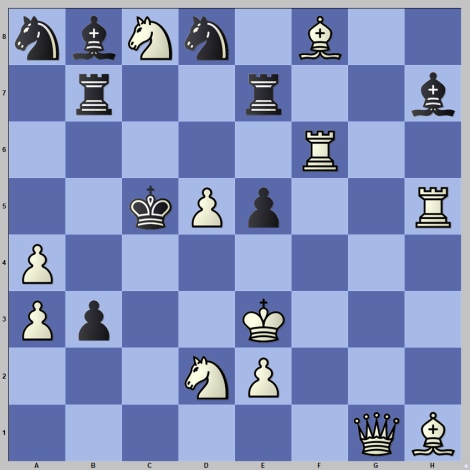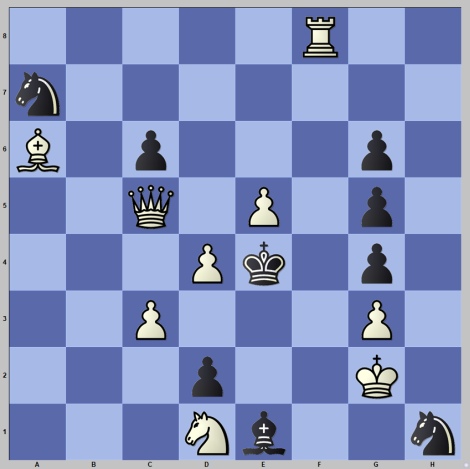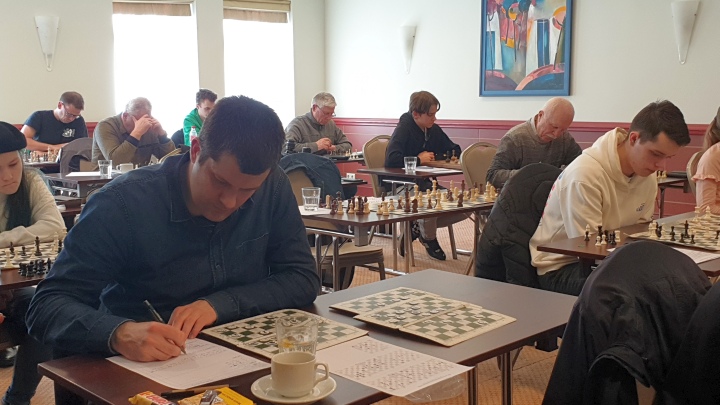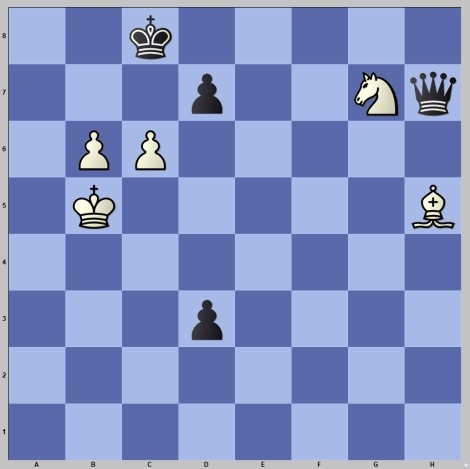Laura Rogule left all Latvian men behind; Martynas Limontas extends the lead in the World Solving Cup
Latvia is a country with a high percentage of women in top management and other important positions. In the world of chess, Latvian ladies are represented on the highest level by Dana Reizniece-Ozola, the Deputy Chair of FIDE Management Board. At the same time, another prominent Latvian lady has become a star of the World Federation for Chess Composition.
Soon after her first steps in composing (2011), Julia Vysotska (Jūlija Visocka) quickly extended her activities in chess composition, first as the creator and editor of the highly popular website Julia’s Fairies (2012) and then as the Administrator of the WFCC website. Since 2016 she’s been directing the Youth Chess Composing Challenge, and later serving as the Latvian delegate and member of the WFCC Youth Committee. With all those duties, in 2021, Julia managed to become the first-ever woman with the title of the FIDE Master for Chess Compositions.
 Julia Vysotska directs the 4th Youth Chess Composing Challenge
Julia Vysotska directs the 4th Youth Chess Composing Challenge
As the President of the Latvian Chess Problem Society, she’s been arranging lessons in chess composition for juniors and organizing all domestic solving competitions. To raise the bar even higher, she hosted and organized two European Chess Solving Championships in Riga back in 2017 and 2022. So, the Open Solving Championship of Latvia, the 5th leg of the World Solving Cup 2022/23, held this month, was just another evidence of her devotion to chess composition.
Latvian solving events are more than just competitions. They combine the beauty of chess art in the fittingly decorated ambient, with perfect conditions and a friendly atmosphere. This year’s edition, held in the heart of Art Nouveau district, in the Neo-Gothic building of the 4-star Monika Centrum Hotels in Riga, was no exception.
 Artistic surrounding for the chess art: solving in the heart of Art Nouveau district in Riga
Artistic surrounding for the chess art: solving in the heart of Art Nouveau district in Riga
The selection of problems made by Antons Gajevskis, the most experienced Latvian solving judge, also had a female touch. Five out of the 14 problems to be solved in four hours (two rounds of two hours each) were composed by women. Both two-movers were by Odette Vollenweider (1933-2021), the famous Swiss chess composer, writer and editor. The next one is very characteristic of Odette’s style: a surprising key move introduces attractive variations and intense tactics:
1

Mate in 2 moves
For many years Odette remained anonymous in the men’s world, using the pseudonym Gabriel Baumgartner. That’s how she signed the problem above and her first book Faszinierendes Schachproblem (1963). At the time of revealing her identity, she became a Swiss delegate in the WFCC and the editor of the chess problem section of the “Neue Zürcher Zeitung”. During the three decades of her caring and passionate editing, the NZZ column became famous. In 2017 she was granted the title of Honorary Master of Chess Composition.
One of the three-movers to be solved in Riga was authored by the Ukrainian chess composer Nadya (Nadezhda) Leontyeva (1928-2012). Nadya was born without both hands in the village of Andriyashivka, Sumi region, and lived most of her life in Rivne. She started composing in 1962, producing around 220 problems and endgames, mostly three-movers. In 1973 she earned the title of Candidate Master in chess composition and left a mark in the theory of #3 with the “Rivne theme”. Her three-mover presents two harmonious pairs of quiet moves by White after mutual obstructions by black pieces, completely solved only by four participants:
2

Mate in 3 moves
The Riga selection also included a selfmate in two moves by Edith Baird (1859 – 1924). Mrs Baird (née Winter-Wood), was the most prolific chess composer in the world of her day, with over 2000 problems to her credit. She published two books with selected compositions and was sometimes referred to in the press as the “Queen of Chess”. Her daughter Lilian Edith also became a chess composer.
Finally, one of the two fairy problems (the trademarks of the Latvian Open Championships since 2018) was by the main organizer Julia Vysotska, specially composed for this event. It proved to be the most difficult of all 14 problems and was completely solved only by the overall winner of the Open section.
The outcome of the 49th Latvian Solving Championship deserves special attention, as perfectly fitting to the overall female contribution in Riga. It was the Woman Grandmaster Laura Rogule who left all the Latvian men behind, and it was no surprise at all.
 Laura Rogule in action
Laura Rogule in action
Latvia is probably the only country where a woman leads the overall rating list in any chess branch. The 12 times chess champion of Latvia for women is among the top 4 women in the World’s Solving List, and now she has won her second domestic solving title ahead of men. Her main rivals were the winners of the previous two domestic championships. The silver medal went to the 17-years old rising talent Emīls Tabors, the defending champion, and the winner from 2021 Emīls Miķelis Miķelsons ended in third place, closely followed by the ex-champion Rāviņš Modris.
Laura Rogule is not only a great champion, but she is also a skilled trainer, first in chess and then in chess composition, too. This time she prepared her daughter Lauma Mieriņa for the junior solving competition held at the same time. In her first appearance, 11-years old Lauma won the bronze medal, not so far behind the winner Mihails Pučinskis and runner-up, Mihails Šalašovs, both one year older than her. The boys should soon beware of a strong rival coming.
The event bridged the generational and historical gaps. It was nice to see the oldest participant Ēriks Priednieks (84), who won the silver medal in the 1st Latvian Chess Solving Championship in 1972 and was 12 times among the medallists.
 Ēriks Priednieks (84) won silver medal in the 1st Latvian Chess Solving Championship (1972)
Ēriks Priednieks (84) won silver medal in the 1st Latvian Chess Solving Championship (1972)
Back to the international event, the Open Solving Championship of Latvia was convincingly won by Martynas Limontas, with the maximal result of 70 points. The Solving Grandmaster from Lithuania has extended his lead in the World Solving Cup Standings 2022-23, and the 2nd ranked Kevinas Kuznecovas has become his main rival on the top. The domination of Lithuanian solvers in Riga was extended to all five top places: Vidmantas Satkus was the 3rd, Stasys Steponavičius 4th, and Arvydas Mockus got the 5th place.
 Martynas Limontas and Emīls Tabors busy in the first row
Martynas Limontas and Emīls Tabors busy in the first row
Among the harder nuts, the next endgame hides a surprising final position after White’s 8th move:
3

White to play and win
The next WSC legs will be the Open Solving Championships of Serbia (April 29-30) in Belgrade and Lithuania (May 6-7) in Kėdainiai. The Belgrade competition will see the first appearance of the reigning World and European Champion, Danila Pavlov, in the WSC 2022/23.
Solutions:
1. Odette Vollenweider, Schweizerische Schachzeitung 1963: 1.Rf4! ~ 2.Rc4#, 1…exf4+ 2.Kf3#, 1…e4 2.Qc1#, 1…Nb6 2.Nxb3#, 1…Bd3 2.Kxd3#, 1…Be4 2.Kxe4#, 1…Rb4 2.axb4#
2. Nadya Leontyeva, Szachy 1976 (version): 1.Bc4! (-) 1…Bxg3 2.Qd6, 1…Bf2 2.Qb6, 1…Nxg3 2.e6, 1…Nf2 2.d5, etc.
3. Mirko Miljanić, Olimpiya dünyasi 2008 (version Politika 2015): 1.b7+ Kb8 2.cxd7 Qh8 3.Be8 Qh4 4.Ne6 d2 5.Bh5! Qxh5+ 6.Kb6! d1Q 7.d8Q+ Qxd8 8.Nxd8 +-
All results, problems, and solutions from Riga, as well as the WSC standings, are also presented in the World Solving Cup Calendar of the WFCC.
Text: Marjan Kovačević, WFCC President
Photos: Julia Vysotska
Official website: WFCC – World Federation for Chess Composition

